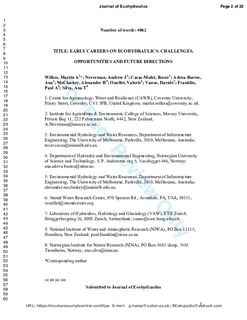Early careers on ecohydraulics: challenges, opportunities and future directions
Wilkes, Martin A.; Neverman, Andrew J.; Casas-Mulet, Roser; Adeva Bustos, Ana; McCluskey, Alexander H.; Ouellet, Valerie; Vanzo, Davide; Franklin, Paul A.; Silva, Ana T.
Journal article, Peer reviewed
Accepted version

Åpne
Permanent lenke
http://hdl.handle.net/11250/2488382Utgivelsesdato
2016Metadata
Vis full innførselSamlinger
- Publikasjoner fra CRIStin - NINA [2364]
- Scientific publications [1392]
Sammendrag
Early career researchers (ECRs) play a critical role in our knowledge-based society, yet they are the most vulnerable group in the scientific community. As a young, interdisciplinary science, ecohydraulics is particularly reliant on ECRs for future progress. In 2014, the Early Careers on Ecohydraulics Network (ECoENet) was created to help the development of young researchers in this field. In this paper, we synthesize the outcomes of a workshop for ECRs organized by ECoENet in February 2016. We aim to show how the potential of ECRs can be maximized to drive progress in ecohydraulics. According to the most recent entrants to the field, major challenges lie in becoming more integrated as a discipline, developing a common vocabulary and a collective vision, engaging effectively with policy-makers, and encouraging public participation. ECRs need to develop their careers on an international scale in a way that crosses traditional disciplinary boundaries, including the social sciences, and allows them time to work at fundamental levels rather than focusing solely on individual applications. We propose a strategy to facilitate this by providing: a platform for disseminating research; an international support network; and a set of services for enhancing ECR training and experience. Early career researchers; interdisciplinary science; ecohydraulics; society; ecology; hydraulics
